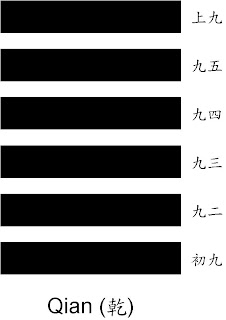There are different methods of “Divination using Yi-jing”, for short, let’s call them “Yi-bo” (易卜). In fact, we should call it “Yi-shi” (易蓍) since “Bo” (卜) is related to “Gui-bo” (龜卜) and is from the cracking sound of an expanded tortoise shell due to heating while “Shi” (蓍) is the milfoil stalks used for Divination of Yi-jing. Both of which are used for “Casting” (起卜 or 起卦).
Among them, “Wen-wang-gua” (文王卦, or WWG) is one of the Yi-bo methods which was believed to be developed during Song Dynasty. People mistakenly refer WWG as its earlier derivative, Huo-zhu-lin-fa (火珠林法), as both of them are quite similar in terms of Casting and “Setting” (裝卦). However, there are major differences in terms of Deciphering (解卦, or Interpretation).
 “Wen-wang” (文王) refers to Emperor Wen (文) of Zhou (周) Dynasty. In fact, Emperor Wen never took the throne. He was named as Emperor only after his son Emperor Wu (武) overthrew Emperor Zhou (紂) of Shang (商) Dynasty and become the first emperor of the Zhou (周) Dynasty. It is also believed that Wen-wang completed his interpretations of the 64 hexagrams as their associated 384 lines (or “Yao” 爻), which are called as “Gua-ci” (卦辭) and “Yao-ci” (爻辭) respectively, when he was jailed as prisoner of Emperor Zhou. Using the hexagram of Qian (乾) as an example:
“Wen-wang” (文王) refers to Emperor Wen (文) of Zhou (周) Dynasty. In fact, Emperor Wen never took the throne. He was named as Emperor only after his son Emperor Wu (武) overthrew Emperor Zhou (紂) of Shang (商) Dynasty and become the first emperor of the Zhou (周) Dynasty. It is also believed that Wen-wang completed his interpretations of the 64 hexagrams as their associated 384 lines (or “Yao” 爻), which are called as “Gua-ci” (卦辭) and “Yao-ci” (爻辭) respectively, when he was jailed as prisoner of Emperor Zhou. Using the hexagram of Qian (乾) as an example:乾:元亨。利貞。
初九:潛龍勿用。
九二:見龍在田,利見大人。
九三:君子終日乾乾,夕惕若,厲,無咎。
九四:或,躍在淵,無咎。
九五:飛龍在天,利見大人。
上九:亢龍有悔。
用九:見羣龍無首,吉。
初九:潛龍勿用。
九二:見龍在田,利見大人。
九三:君子終日乾乾,夕惕若,厲,無咎。
九四:或,躍在淵,無咎。
九五:飛龍在天,利見大人。
上九:亢龍有悔。
用九:見羣龍無首,吉。
Conficius interpreted Qian as Strong (健). His followers further interpreted Qian as Hard or Unyielding (剛). According to ancient Chinese dictionary, Qian mean Key (鍵). Yes, as key for lock. Obviously, the meaning would be quite different if you use key to interpret Qian.
We don’t know why WWG is named as there is no direct relationship between this special Yi-bo method and Wen-wang, but we are accustomed to call it WWG.

No comments:
Post a Comment